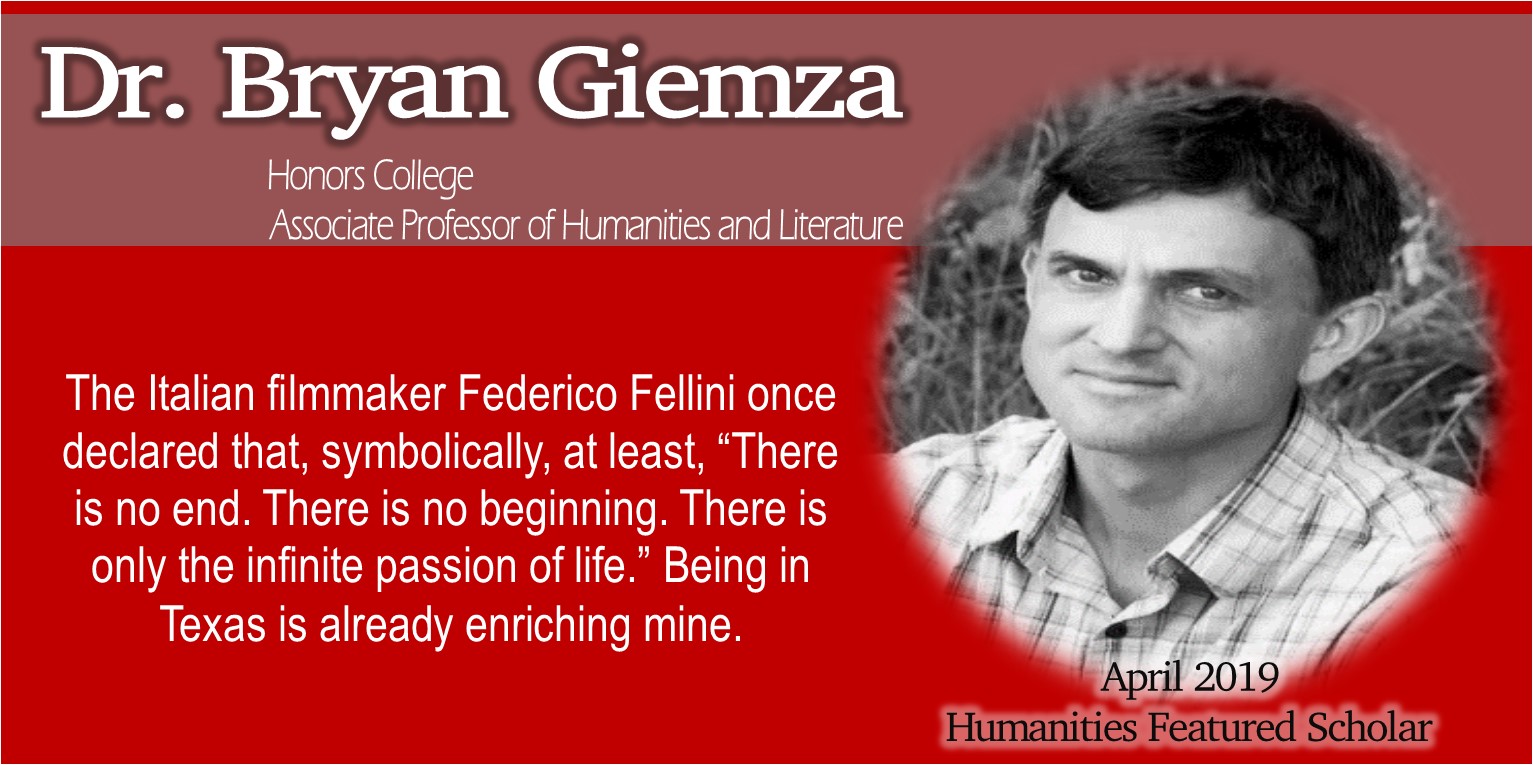Featured Scholar - April 2019

What are you watching/streaming?
There's a loose-fitting theme here: Texas and the West, or at least the way it's imagined
on the screen. It seems like the best films in this area embrace the west that never
was while somehow telling us something about what it means (did you know that tumbleweeds
are an introduced species, for goodness sakes?).
The Coen brothers' Ballad of Buster Scruggs is pure catnip to me as an American studies and literature professor. Scruggs offers tributes to Stagecoach, James Joyce, and others, especially the "Meal Ticket" vignette, which brims with literary allusions. Its dark sense of humor suits me well. I rewatched The Last Picture Show (1971) recently, too, and still admire its humanity and translation of McMurtry's work. Also watched El Norte (1983) and Paris, Texas (1984). The last two were films directed by foreigners, so their imagination of the border and the southwest offers the gift of an outsider's angle of vision.


A few of my West Texas sunset photos.
What are you listening to?
If my-life-in-2019 were to have a soundtrack, the music from The Ballad of Buster Scruggs would serve well. The soundtrack of the new Coen brothers movie offers a medley of
familiar tunes, including "The Streets of Laredo," (curiously) "Mother Machree," etc.
So you feel you've heard much of it before—and you have, in the same way that we've
all been west via the westerns—but it's a unique meditation on what comprises the
"western."
Also on my ear and in my mind: I recently visited the Outlaw Country exhibit at the Country Music Hall of Fame in my wife's city, Nashville. The Hub City is certainly part of that musical hub, and as part of settling into Lubbock, I've been working my way through Terry Allen's oeuvre, especially Juarez, the dark heart of which pairs well with my Cormac McCarthy class. Lubbock on Everything was so far ahead of its time that our time is only catching up with it. What an introduction to Lubbock!
What are you reading?
Texas, again, as part of a campaign to get up to know this most interesting state
a little better. Particularly enjoyable was Paulette Jiles's News of the World, which channels the captivity narratives I often teach in American literary history,
taking the reader on a historically authentic journey from West Texas to the panhandle.
Also on the Texas list: Max Crawford's Lords of the Plains. Bryan Mealer's Kings of Big Spring. Lawrence Wright's God Save Texas. Seeing how the "victors" (note scare quotes) represent their histories in Robert
Carter's edition of On the Border with Mackenize and William Thomas Hamilton's My Sixty Years on the Plains. Michael Parker is a fellow North Carolinian who lives and writes in Austin these
days, and his new short story collection, Everything, Then and Since has grabbed ahold of my imagination powerfully.
Part of my role at Texas Tech is to help bring out the treasures of the Sowell Collection to broader audiences. So it has been a pleasure to read more deeply in writers from the collection as part of my current rotation. Llano Estacado: An Island in the Sky has been a kind of baptism and guide. Also in this set on the bedside table is A Great Aridness by William deBuys. I recently finished Kurt Caswell's An Inner Passage and was reminded again how fortunate I am in my colleagues.
What are you writing/thinking about?
I'm developing a humanities course called In Search of Texas Beauty: An Exploration of the Natural and Literary History of Apples. Texas Beauty is one of sixty-some apples varieties developed in Texas, now presumed
extinct. But is it really? Maybe we can find some living stock to graft from. The
course promises to be an odyssey and will be a good opportunity to collaborate with
students and colleagues, including my friend Lee Calhoun, who is an expert on southern
apples, and Professor Susan Tomlinson, who is an accomplished botanical illustrator.
I'm working on other humanities projects, too. One is Livable Futures, an interdisciplinary initiative led by the Honors College and centered in the Sowell Collection in Literature, Community and the Natural World. Another is geared towards the San Antonio African American Community Archive and Museum, which I've been involved with since its founding. And I continue to support InHerit and work documenting the natural and cultural history of cenotes in Yucatan by putting archival tools in the hands of all kinds of people.

The cenote in Valladolid.
The longer research project is a history of the Rosenwald Fellows. The Rosenwald Fund, established in 1917 by businessman Julius Rosenwald and his family for "the well-being of mankind," is celebrated for establishing schools for African Americans throughout the US South during the Jim Crow era. Beyond the Fellows who became household names---like Zora Neale Hurston and James Baldwin--the book describes some of those who applied but who never achieved fame or else found a measure of success and then faded into obscurity.

Rosenwald Fellows: writer Marcus Bruce Christian, designer Bernice L'Tanya Griffin, and artist Frank Neal (from Palestine, TX).
And then there's my novel, the tale of a Vietnam vet-turned-smuggler in the coastal Carolinas of the 1970s, which I work on during stolen hours.
I've been treated with extraordinary kindness and hospitality by people in West Texas since I've arrived. I've been given dried apples by a Comanche woman, invited to ranches and vineyards, and made to feel a part of the Texas Tech family, beginning with the Honors College.
The Italian filmmaker Federico Fellini once declared that, symbolically, at least, "There is no end. There is no beginning. There is only the infinite passion of life." Being in Texas is already enriching mine.
Humanities Center
-
Address
Texas Tech University, 2508 15th Street, Weeks Hall 221, Lubbock, TX 79409-1002 -
Phone
806.742.3028 -
Email
humanitiescenter@ttu.edu
